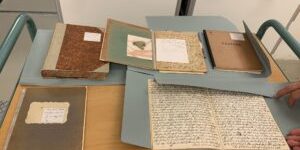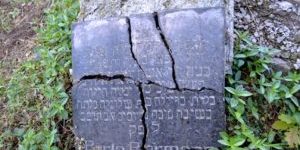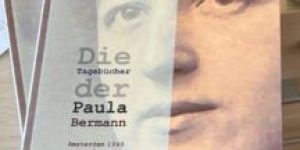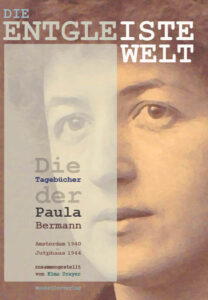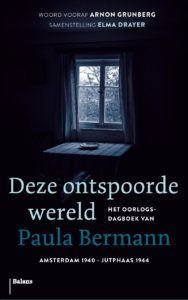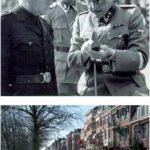June 15, 1940 ~ The Impossible Has Come True
No comments yet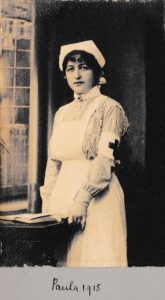
Paula Bermann as a nurse in the war (1915)
June 15, 1940
Since 10 May, the impossible has come true. Holland at war with Germany! For five days the Dutch soldiers fought bravely with great heroism, but due to the great superiority – air power and an army of millions and without outside help – Holland capitulated after a few days. Rotterdam was half destroyed on the very last day – a cruel fate suffered by this city and we must be eternally grateful to General Winkelman that he did not allow Holland to be destroyed. Rhenen, the Grebbelinie, Breda, Wageningen and especially Zeeland, where the battle raged for 13 days, show the traces of great destruction. I cannot write, too much has happened and my soul is still too shaken and I still too off balance to write down what is going on inside me, to gather my thoughts and cast them into form.
But I want to write again, maybe it will calm me down. But the best is already gone! I destroyed three books that I had written for Sonja since 1933, in which I wrote down all my emotional feelings in great detail and honestly, in the first horror, because I occasionally wrote down my opinion about politics and Judaism and thought that if the Nazi regime came here, they might find my books! Silly me! As if my own ideas were so interesting! Now I’m sorry and I’m suffering. I feel as if part of my soul and body is dead, because I wrote so much and it’s all gone.
All the suffering of the last years, the growing up of the children, the suffering they did to me, consciously or unconsciously, the joys, big and small, that daily life brings, the enjoyment of books – all my own reviews of the more than 600 books I wrote down, I destroyed. Good books I read, the brief contents of which I wrote down, and now I am back to where I was before. Books, they are my balm. Some books I burned because I didn’t want the books that contained political tendencies in my library and now I feel sorry for the poor books too. What have they done? Nothing.
And my diaries? I feel as if the pages are still accusing me today, they give me no peace and rob me of my mental equilibrium. I wrote everything down with such love, I wanted to give an account in my books, because here between the sheets I really lived. In daily life, in the struggle between wife, mother, and housewife, I am another, a “sloof”, an often misunderstood woman and often a foreign German. Even my children sometimes don’t like my way, which is so German for them, my accent hurts them, but they are modern children, not evil, clever, and they will do better than me, if it is in their power, to build their lives according to their own way of life. Only Sonja, the smallest, whose life I described in my books from the age of 5, half understands me, and she suffers from the sarcastic manner of the others, who are less absorbed in the emotional life of others than she is. Sonja is soft, too good, her soul is like mine was, tender, mild, all-giving and never comprehending. Will her life be difficult?
My husband lost his job in 1932, then he became ill, which affected him mentally, so that he lost his mental vigour, his great energy, and became another man. He never found a steady job again, small stock market earnings and the pension of our fortune made it possible that we could still live well for eight years. Now the war comes and for five weeks everything lies still and nothing is earned.
What future awaits us Jews? Rumour has it that the same fate does not await us Jews here in Holland as awaits the Jews in Germany, Austria and Poland. But I have no illusions, I expect everything or nothing. I am ready for anything.
About Paula Bermann:
Paula Bermann is the author of this diary. She was born on 9 March 1895 in the German village of Konken in the federal state of Rhineland-Palatinate. Her Jewish parents died in the 1920s. They were buried in the Jewish cemetery in neighbouring Thallichtenberg.
On 22 August 1918, Paula Bermann married the Dutch Jew Coenraad van Es and moved to Amsterdam. In the years 1940-1944, Paula, by then the mother of three growing children, wrote a diary. In this diary she noted events that took place in the city and in the world. It ends with a note dated 19 March 1944, in which she writes that a Nazi friend is moving into a flat down the street, right next to her address in hiding. They have to leave, but where to? Shortly afterwards, after a period in hiding, they are betrayed and arrested. Coen van Es and his wife Paula died in the Bergen-Belsen concentration camp in early 1945.
Paula Bermann wrote the diary in German Kurrent script. The diary, which consists of four booklets (the last booklet, by the way, is an unused cash book for lack of anything better), was passed on to the surviving relatives after the war. It remained untouched for a long time because the foreign bookmarks could not be deciphered. When reading the German text, one must bear in mind that Paula had already been living in Amsterdam for twenty years when she began to write down the diary in her native German. Incidentally, it is all too understandable that there are countless Dutchisms in her use of language. Such formal fault lines are telling. They document the lonely position of a German Jew in the Netherlands, who was hounded by the Nazis, her compatriots, and was not always understood by her Dutch environment, sometimes even insulted because of her German roots.
You May Also Like
Comments
Leave a Reply



